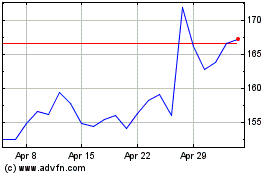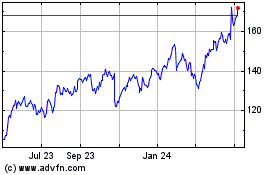Mnuchin Backs Trump's Threat of Tariffs Against European Car Companies -- Update
January 22 2020 - 6:40AM
Dow Jones News
By Paul Hannon
The U.S. may impose tariffs on imports of European automobiles
if countries on the continent press ahead with plans for taxes on
digital companies such as Alphabet Inc.'s(GOOG) Google and Facebook
Inc. (FB), U.S. Treasury Secretary Steven Mnuchin said
Wednesday.
"If people want to just arbitrarily put taxes on our digital
companies, we'll consider arbitrarily putting taxes on car
companies," Mr. Mnuchin said at a panel during the World Economic
Forum's annual meeting in Davos.
He also said a fresh trade deal between the U.S. and China that
could see tariffs rolled back might be possible before
November.
On Monday, France agreed to delay the imposition of its own
digital tax in the face of threats of steep U.S. tariffs on French
exports. But the U.K. reaffirmed its plan to tax digital companies
from April, while Italy and Austria also have digital taxes.
Mr. Mnuchin said those taxes are "discriminatory in nature"
because they mostly affect U.S. companies.
In an interview on the sidelines of the World Economic Forum on
Tuesday, President Donald Trump said he would impose new tariffs on
European car imports if the European Union didn't agree to a new
trade deal.
Despite the threat, U.K. treasury chief Sajid Javid said his
government will introduce its digital tax as planned.
"We plan to go ahead with our digital services tax," he said,
while speaking on the same panel as Mr. Mnuchin. "It is a
proportionate tax, and it is a tax that is deliberately designed as
a temporary tax."
Mr. Mnuchin said he and Mr. Javid would "be having some private
conversations about that" and said he expects Mr. Trump to engage
with U.K Prime Minister Boris Johnson on the issue.
"I'm sure the president and Boris will be speaking on this," he
said.
The U.S. and China last week reached a eight-part agreement that
acts as a cease-fire in a two-year trade war. But it left in place
U.S. tariffs on about $370 billion in Chinese goods, or about
three-quarters of Chinese imports to the U.S.
Possible tariff reductions were left to later negotiations,
known as "phase two." They will cover a host of difficult issues at
the heart of the trade battle, including Chinese subsidies to
domestic companies and Beijing's oversight of Chinese state-owned
firms. Those talks are expected to begin soon.
Mr. Mnuchin said Wednesday it was possible the talks could be
concluded before the November presidential elections. Most trade
experts had expected the talks to run beyond that date, given the
complexity of the issues to be addressed.
"We dealt with a lot of important issues in phase one," said Mr.
Mnuchin. "If we get it done before the election, good. If not,
fine. There's no deadline."
Most economists judge that higher tariffs on trade between the
U.S. and China have slowed global economic growth. But Mr. Mnuchin
defended their use, saying China and other countries wouldn't have
come to the negotiating table without their imposition.
"They're a big incentive for China to continue to negotiate," he
said. "It's about free, fair and balanced trade. This is good for
us, and good for them."
Speaking on the same panel, the head of the International
Monetary Fund said trade disputes would continue to dampen global
growth this year, although the agreement between the U.S. and China
was "a piece of good news."
"Trade truce is not the same as trade peace," said IMF Managing
Director Kristalina Georgieva. "Trade peace is what we should be
looking for."
Write to Paul Hannon at paul.hannon@wsj.com
(END) Dow Jones Newswires
January 22, 2020 06:25 ET (11:25 GMT)
Copyright (c) 2020 Dow Jones & Company, Inc.
Alphabet (NASDAQ:GOOGL)
Historical Stock Chart
From Mar 2024 to Apr 2024

Alphabet (NASDAQ:GOOGL)
Historical Stock Chart
From Apr 2023 to Apr 2024
